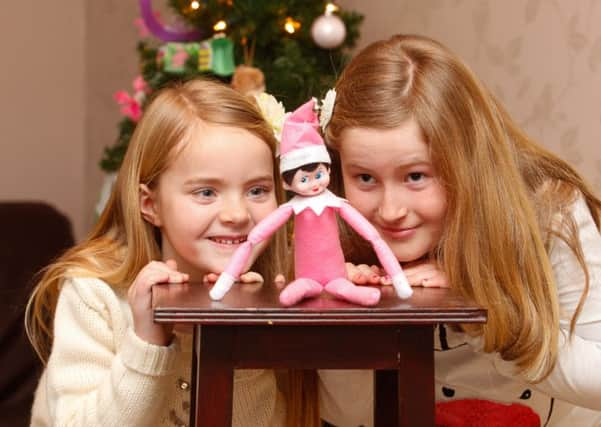Elf on the Shelf may damage youngsters' health


But according to Scottish psychologists, deploying an “Elf on the Shelf” to spy on Santa’s behalf can cause children to feel anxious and frightful.
Based on a fictional character in an American book, the US tradition of placing an elf doll in the house to keep an eye on children has been spreading to the UK in recent years.
Advertisement
Hide AdDispatched from the North Pole, the dolls are used to encourage children to make sure they stay on Santa’s “Nice” list by reporting good or bad behaviour back to Santa.
But Scottish child experts warn the concept could be disturbing and cause fear and shame in children.
Ewan Gillon, a chartered psychologist and clinical director of First Psychology Scotland, said: “The idea of an elf that comes alive and moves around the house whilst we sleep, watching our every move can be rather scary and disturbing for a child and may well cause significant repercussions.
“The elf itself is one which most children usually consider a positive Christmas character; however they may start to feel uneasy knowing that it’s going to come ‘alive’ during the night and they won’t know when, or see it moving around.
“This unknown can cause real anxiety, especially those who may already have a fear of ‘haunted toys’, or toys they have seen come alive in films.”
“It may also lead to longer term negative feelings around the event of Christmas itself. Using the threat of the elf as punishment for bad behaviour can cause confusion, especially for younger children who need their punishment to follow immediately after their bad behaviour, in order to understand it. Many smaller children will struggle to process the link between their behaviour and them not receiving Christmas presents and such threats can lead to further behavioural issues.” Dr Katherine Edward, chartered and clinical psychologist based in Edinburgh, said: “The concern I would have with the “Elf” is the manner in which children might feel that they have ‘ruined’ something and cannot make it right if they show what is natural curiosity and pushing of boundaries.
Advertisement
Hide Ad“There should always be the chance for children to learn from mistakes and make things right.”
She added: “In the end it always comes down to how parents utilise these traditions and ensuring it is a light hearted way of ‘encouraging’ and not ‘punishing’ or ’scaring’ to help children feel their ‘good’ behaviour can produce results rather than their ‘bad’ behaviour produces consequences that are so negative they cause distress.”Scottish psychologist Patricia Duggan, added: “If parents are particularly punitive and authoritarian then the ‘elf’ could potentially be a cause of further fear and even shame.
Advertisement
Hide Ad“However if parents have an authoritative style where positive behaviours are praised and where children know they can easily repair the effects of any negative behaviours then I would suggest there would be little harm in notions such as this elf.
“Perhaps the elf should be watching to observe our children’s attempts at being good, and if they are a bit naughty they needn’t worry too much because mum and dad will always help them to get back on the nice list in time for Christmas.”
Justine Roberts, CEO of parenting website Mumsnet said its users were divided about Elf on the Shelf. She said: “ Some think it’s a way of gently encouraging good behaviour as the festive pressure ramps up, while others see him (or her) as a creepy surveillance operative in striped leggings.”